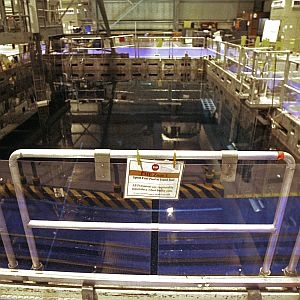
(Host) Vermont lawmakers want to know at what point the Vermont Yankee plant should be closed to stop a radioactive leak.
But they were told by federal officials that the problem isn’t serious enough to warrant a shutdown.
VPR’s John Dillon reports:
(Dillon) The Nuclear Regulatory Commission is the main federal agency responsible for overseeing reactor operations and safety. John White is the NRC’s branch chief for reactor safety. He and a half-dozen other members of the commission’s staff spoke by conference call with three legislative committees.
(White) "Why doesn’t NRC require this plant to be shut down? We have found no indication that Entergy Vermont is in non-compliance with any NRC rule or regulation relative to their continued operation of the facility."
(Dillon) Radioactive tritium has shown up in groundwater wells at the Vernon site. Some of the readings are over 2 million picocurries per liter – close to the level found in the reactor itself.
State officials say the tritium is flowing through the ground to the nearby Connecticut River.
But the NRC says the tritium is not a health threat, since no one is drinking water from contaminated wells. The NRC’s White said Yankee is within its legal limits for releasing material into the environment.
(White) "That includes radiological effluents. As we review the data available to us, we find no indication that Vermont Yankee has exceeded any NRC regulatory limit relative to liquid effluents into the Connecticut River."
(Dillon) The NRC’s answers did not satisfy some lawmakers. East Montpelier Democrat Tony Klein chairs the House Natural Resources and Energy Committee. He said the committee had heard from the Legislature’s own nuclear expert that Yankee had recently discovered seven underground pipes that the NRC didn’t know about.
Klein said he was not comforted by the NRC’s oversight.
(Klein) "If the management of the plant did not know those pipes existed, I want to know how you would know they existed and then how you could regulate them?"
(Dillon) The NRC said it could not respond to the question without more detail.
The session with the federal regulators came as lawmakers consider a vote this year on whether to allow Yankee to operate for another 20 years.
Entergy Vermont Yankee told the state for more than a year that it did not have underground pipes that could leak. Now plant technicians are excavating the site trying to identify one or more underground leaks.
And the state of Vermont is investigating whether Yankee has illegally polluted the groundwater or the river. Justin Johnson is the state’s environmental conservation commissioner.
(Johnson) "We’re treating like we would any other alleged violation. On the face of it, it would seem that there’s an un-permitted discharge. Exactly what that means, and how big it is and what impact it might have is something we’re looking into."
(Dillon) Johnson said the case has been referred to the enforcement division. The Yankee radioactive leak is now being handled by several state agencies. They’ve set up a command center and assembled a team that includes legal advisors, technical specialists – even someone to sample agricultural products for contamination.
Officials said Yankee would be billed for the work. The state’s response also has an official name: Operation VY Tritium 2010.
For VPR News, I’m John Dillon in Montpelier.